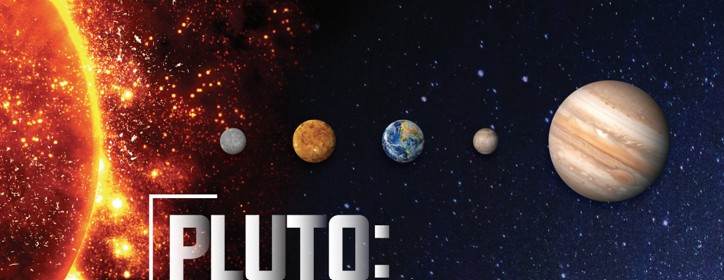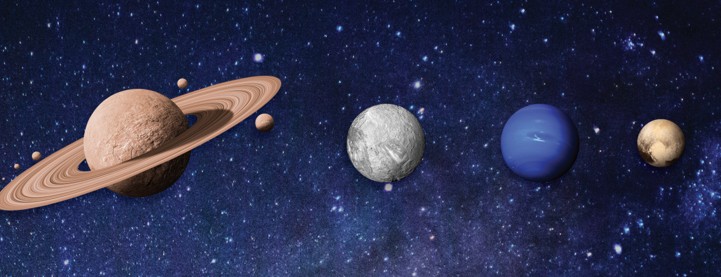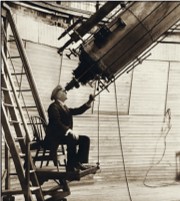
Think about the following questions.
1. What is the definition of the word "planet"?
2. What do you know about Pluto?
3. Are you interested in news about space exploration? Why or why not?
VOCABULARY PREVIEW
Match each New Academic Word List(NAWL) word with the correct definition.
- fraction
- terminology _____
- dilemma _____
- semantic _____
- solar _____
- denote _____
- a. of or relating to the Sun
- b. of or relating to the meanings of words and phrases
- c. a part of a larger whole
- d. the special words or phrases used in a particular field
- e. a situation in which a difficult choice is required
- f. to mean something; to show, mark, or be a sign of something
PLUTO: DWARF PLANET

In 2005, an astronomer1 in California looked through a telescope2 and found a large rocky object near Pluto. It looked large enough to be a planet. In fact, it seemed to be slightly bigger than Pluto. Thus, this object, which was eventually named Eris, created a dilemma for scientists. They had two choices: they could declare Eris the tenth planet in our solar system, or they could take away Pluto's status3 as a planet. In Prague, on August 24, 2006, the International Astronomical Union (IAU) took a vote on the proper terminology. The result was that Pluto and Eris were classified as "dwarf planets." In other words, there was one less planet in our solar system.
The IAU's resolution4 stated a three-part definition of “planet” that Pluto and Eris do not meet. To be called a planet, a body must 1. orbits5 the Sun, 2. have enough mass that it takes on a roughly round shape, and 3. be big enough to "clear the neighborhood" around its orbit. Number 3 means that planets dominate their area of space because they have either destroyed all other large nearby bodies or incorporated6 them. In contrast, the term "dwarf planet" denotes a body that fits numbers 1 and 2 but not 3, and is not a moon. Pluto was re-defined as a dwarf planet because it has not cleared its neighborhood. Only 2,300 kilometers wide, smaller than Earth's moon, it is one of the largest objects in the Kuiper belt. This is a section of the outer solar system containing many icy bodies that are smaller than planets.
The IAU's decision caused controversy among both scientists and the public. Although the change was semantic rather than scientific, some astronomers passionately opposed it. They argued that there is no precise definition of a planet's "neighborhood" or what it means to "clear" it. They also pointed out that the vote had only involved a small fraction of the 10,000 members of the IAU, with 237 voting for the resolution and 157 against. Some also worried that the new classification might wrongly make Pluto seem less important. That could affect future decisions about funding.
Ordinary people who had learned about Pluto in school were sad to see it go, almost as if they were losing a friend. The public feels a kind of affection7 for the smallest and most distant planet. Discovered in 1930, Pluto was named at the suggestion of an eleven-year- old girl. "Pluto" is the name of the Roman god of the underworld8. But it is also the name of a cute Disney dog, which may partially explain the affection. One science journalist told Wired magazine, "We've thought of it as a poor little oddball9 that didn't fit in with the rest of the kids in the solar system and really needed to be protected."
Even as the IAU was taking its historic vote in 2006, NASA's New Horizons space probe was already eight months into its long journey toward Pluto. On July 14, 2015, New Horizons flew within 12,500 kilometers of Pluto's surface, gathering priceless data and images, and putting the dwarf planet back in the news. Interestingly, the man in charge of that mission10, Dr. Alan Stern, disagrees with the IAU's decision. He rejects the idea that a true planet must clear its neighborhood. "They botched11 it,” he told an audience in 2021. Many fans of Pluto agree. Pluto may have lost its status as a planet-at least for now-but it maintains its hold on our imaginations.
New Academic Word List
- astronomer 1 : n. a scientist who studies stars, planets, and other objects in space
- telescope 2 : n. a device shaped like a long tube that you look through in order to see things that are far away
- status 3 : n. position or rank in relation to others
- resolution 4 : n. a formal statement that expresses the feelings, wishes, or decisions of a group
- orbit 5 : v. to travel around something (such as a planet)
- incorporate 6 : v. to include as part of something else
- affection 7 : n. a feeling of liking and caring
- underworld 8 : n. in ancient myths, the place where people's souls go after death
- oddball 9 : n. a person who behaves in strange or unusual ways
- mission 10 : n. a flight by an aircraft or spacecraft to perform a specific task
- botch 11 : v. to do something badly; to ruin
READING COMPREHENSION
A ‣ Mark each statement as true (T) or false (F) according to the reading.
- Pluto and Eris are both dwarf planets.
- True
- False
- To be a planet, a body must be mostly round.
- True
- False
- Earth is located in the Kuiper belt.
- True
- False
- The IAU has a few hundred members.
- True
- False
- New Horizons reached Pluto in 2006.
- True
- False
B ‣ Choose the best answer according to the reading.
- What does the reading mainly discuss about Pluto?
- a. Its change in status
- b. Its scientific history
- c. Reasons to study it
- d. The public's feelings about it
- The word it in paragraph 2 refers to _____.
- a. definition
- b. planet
- c. body
- d. Sun
- What can be inferred about Eris from the reading?
- a. It has destroyed all nearby bodies.
- b. It is not roughly round in shape.
- c. It orbits Pluto rather than the Sun.
- d. It is smaller than the Earth's moon.
- Which is NOT true about the IAU vote?
- a. It took place in 2006.
- b. It was about naming rather than science.
- c. It upset some astronomers.
- d. It involved most of the IAU's members.
C ‣ Look for the answers in the reading and write them on the lines.
- Why does Pluto not fit the IAU's definition of a "planet"?
_____ - What is the Kuiper belt?
_____
SUMMARY
Fill in the blanks with the phrases in the box.
- the new definition
- felt sad
- their neighborhoods
- discovery of Eris
- only a fraction
- the space probe
|
The Decision ↓ The Reaction |
|
|
Scientists
|
|
|
The Public
|
VOCABULARY PRACTICE
Fill in the blanks with the words in the box. Change the form if necessary.
- semantic
- terminology
- dilemma
- solar
- fraction
- denote
- The color red is used to _____ passion or danger.
- _____ panels provide clean and renewable energy, but they are expensive.
- Learning a language means gaining both grammatical and _____ knowledge.
- Our brains work very fast, processing information in a(n) _____ of a second.
- My _____ is that the concert I want to see is on the same night as my friend's birthday party.
- All sports have their own _____ ; for example, in baseball you score runs, not points.
SUPPLEMENTAL READING
Planet X

People have always looked to the skies and wondered about what they saw. Five planets besides Earth-Mercury, Venus, Mars, Jupiter, and Saturn-have been known since ancient times.
Another planet wasn't identified until 1781, with the discovery of Uranus. Observing the new planet, astronomers noticed something strange about its movement around the Sun. It was being pulled out of its expected orbit by the gravity of some large mass, which they guessed was another planet. Scientists calculated the likely size and location of this body and began searching for it, finally locating it in 1846. Neptune thus became the first planet to be discovered by mathematics.
However, Neptune couldn't fully explain all the "wobbles," or unexpected movements, of Uranus's orbit. Additionally, Neptune's orbit also wobbled. The American astronomer Percival Lowell was certain that there was yet another planet beyond Uranus and Neptune. He searched for what he called "Planet X" without success until his death in 1916. Thirteen years later, at the astronomical observatory that Lowell founded, Clyde W. Tombaugh continued the search. With the advantage of a much more powerful telescope than Lowell had used, Tombaugh found Planet X on February 18, 1930, making headlines all over the world.
The new planet needed a name. There were thousands of ideas, but the winning suggestion came from an eleven-year-old English schoolgirl named Venetia Burney. Planet X would be called Pluto. The name's link to the Roman god of the underworld seemed appropriate to the icy, deadly conditions of that planet's surface. And the first two letters are the initials of Percival Lowell, honoring the man who first guessed at Pluto's existence.
Fill in the blanks with information from the reading.
- _____ wasn't discovered until 1846.
- Percival Lowell searched for Planet X for years, but it was _____ who found it.
- An English _____ came up with the idea to call it Pluto.

Leave a comment
Load more